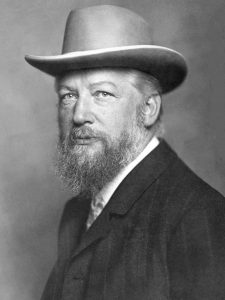As the fourth and final volume in Stephen Gaukroger’s series on the Shaping of Modernity, this book has as its overarching theme the unification of the sciences.
“The argument that I shall be presenting,” he writes, “continues the trajectory of three earlier volumes, which traced key aspects of the legitimation of science and the establishment of a scientific culture up to the early decades of the nineteenth century.” This 4-volume odyssey began with a look medieval times, 1210-1685; the second volume covered 1680-1760, and the third 1739-1841 (my 2017 review of that follows this review). This one overlaps the third, covering 1795-1935. In this book, he “rejects the idea that the sciences can ultimately be reduced to physics…attempting to arrange them into a hierarchy is fruitless and counterproductive.” That many philosophers and scientists have tried to do just that means that this volume traces a lot of unfortunate assumptions, some of which border on lunacy.
A sterling example of this is given on page 98: the mathematical formula for happiness! It comes from the fertile mind of the German Wilhelm Ostwald (1853-1932), who “conceived of a general science of energetics which would unify all forms of enquiry from mathematics to the science of culture.” This ill-conceived notion was directed by Ostwald “against similarly ambitious attempts to give mechanics a foundational standing.”
Gaukroger goes into great detail on how energy was viewed as a unification strategy. He traces it from the work of Joule. “In 1843, his experiments establishing the equivalence of heat and mechanical work brought together mechanical and non-mechanical processes within the one schema.” The author notes that general mechanical principles have until now be considered “in terms of a unification of the physical sciences.” But here he brilliantly goes beyond this: “There are larger questions at issue here, for the unification of the physical sciences is really a prelude to a far more ambitious unification programme.” Some scientist-philosophers set about reducing “all phenomena, organic and inorganic, to theoretical mechanics.” The spectacular failure of this programme has left shards of debris strewn throughout both the physical and life sciences; a close study of this debris is to a large extent what this book is about. Thus, as he states at the outset of this book, this is a “history of scientific culture rather than the history of science as such.” It that is not only succeeds admirably, but positions itself as a paradigm-shifting narrative that all future book on science must acknowledge.
A key aspect of the association of science and reason that he studies is that it can only be found implicitly in England. “Newton, for example, suggests an association of the progress of science and the progress of civilization, but the point is not followed up.” One might think at first he will identify Germany as the locale to study, but no. “It was in France that the association of science and reason came into its own.” This was exemplified by the Encyclopedie of the late 18th century. Here he looks closely at the contribution by Condorcet whose approach “is not concerned with individual achievements but with a large-scale social phenomena which he seeks to subject to a general law.” It was this early attempt, which was adopted in Germany, that led through many twisting paths in the following century to the law of happiness, reduced to a simple equation.
Where England did shine was in grand infrastructure, and the invention of technological marvels: railways, street lighting, piped water, sewage systems, and steam-powered shipping. “Without progress of this kind,” Gaukroger notes, “the progress of science per se would not be of any public concern, nor would it have the standing or value it has had.”
A bit surprisingly, Gaukroger makes a rather startling assertion: “I suggest that the biological sciences, conceived not as part of a unified enterprise but as harbouring an inevitable element of unruliness by comparison with the physical ‘core’, might act as a better model for science generally, and the physical and material sciences more particularly.” This leads him to broadly consider the “transformation of philosophy into a metatheory of science.” The details are fascinating, but too complex to be covered in this review. In sum, these four volumes are a landmark publishing event that has taken from 2006 to 2020 to be completed. An essential resource for any intellectual inquiry.
Stephen Gaukroger, who was educated at the University of London and the University of Cambridge, is Emeritus Professor of History of Philosophy and History of Science at the University of Sydney. He is author of fourteen books and the editor of nine collections of essays.
Civilization and the Culture of Science: Science and the Shaping of Modernity 1795-1935, is $50 by Oxford University Press.
My review of volume 3:
Those living in the 21st century are accustomed to radical climactic theories, but one of the most astounding such theories dates from 1733. We learn this from an important book by Stephen Gaukroger in the third volume of his 4-volume opus on the history of science.
Gaukroger, a professor at the University of Sydney, tell us about John Arbuthnot who offered “what is undoubtedly the most radical claim for climatic theories, when he argues that language differences were due to climate ones.” Arbuthnot wrote that people of northern nations caused their language to abound in consonants because they did not open their mouth very far in cold air, while those in southern climates had a language abounding in vowels for the opposite reason!
There is little to criticise in this book, but one point I must mention is that many people who are quoted, such as Arbuthnot, lack any form of identification beyond their names. His lengthy entry on Wikipedia attests to his importance, but aside from historians of 18th century science few will recognise the name (I included one of Arbuthnot’s studies in one of my own books on the history of astronomy). Thus, his book of 1733 is not put in a context that would make it more relatable to the reader.
Arbuthnot was Scottish, and he is not alone in these pages, as Gaukroger finds a gold mine of intellectual thought north of the English border. Another he mentions is Lord Kames, who believed racial variations have existed from the beginning of the rise of humans. “He even went so far as to posit a multiplicity of Adam and Eves to account for different racial origins.” This was in a book of 1788. Yet another Scot is Adam Ferguson, who had a more nuanced view of progress than many of his time. In Ferguson’s account from 1767, Gaukroger says “from a moral point of view there is not wholly unqualified progress: primitive societies had virtues that may have been lost.” Adam Smith, another great Scottish thinker, had a lot to say about morality in his book of 1759. Due to Smith, says Gaukroger, “Morality is taken out of an abstract realm of intellectual reflection, and becomes a form of sensibility.”
Gaukroger naturally goes far beyond the confines of Scotland. On sensibility, for example, he observes that in France it actually “held a philosophically central position” where thinkers such as Buffon and Diderot believed “our knowledge of the world comes through sensation rather than purely through intellectual reflection.” In England, John Stuart Mill rethought the nature of morality, and developed a philosophical account of it, holding that “the morality of an act depends on its consequences, not on the intrinsic nature of the act, or on the character of the agent.” Gaukroger devotes many pages to the work of Bernard Mandeville on the subject of morality: he saw personal rectitude as “merely a ruse whereby ruling elites lay claim to private virtues, in order to disguise their own self-seeking.” Sounds like the description of today’s politicians! Gaukroger does not give us the priceless title of the first volume of the Dutch edition of his works (Mandeville’s mother tongue was Dutch), but as I enjoy it so much I will share an English translation of it with my readers: The World is Being Ruined by Virtue.
These and hundreds more examples Gaukroger elucidates serve to advance his own broad thematic purpose in this book, which is to look at a fundamental shift in how the tasks of scientific enquiry changed from about 1750 to 1850. He identifies the shift as being one from theological explanations to empirical ones, thus heralding the rise of modern science.
In the first volume of his series to date (whose publication has spanned the decade 2006 to 2016), the author studied the period from 1210 to 1685, “The Emergence of a Scientific Culture.” His second volume overlapped the first, covering 1680 to 1760, “The Collapse of Mechanism and the Rise of Sensibility.” Together, these three books represent one of the landmark achievements in the field of history of science, and represent essential reading for a wide range of disciplines. A tremendous intellectual achievement. We all eagerly await the fourth volume, dealing with science and civilisation from about 1850 to 1950.
The Natural & the Human: Science and the Shaping of Modernity by Oxford University Press (402 pgs) is $63.







